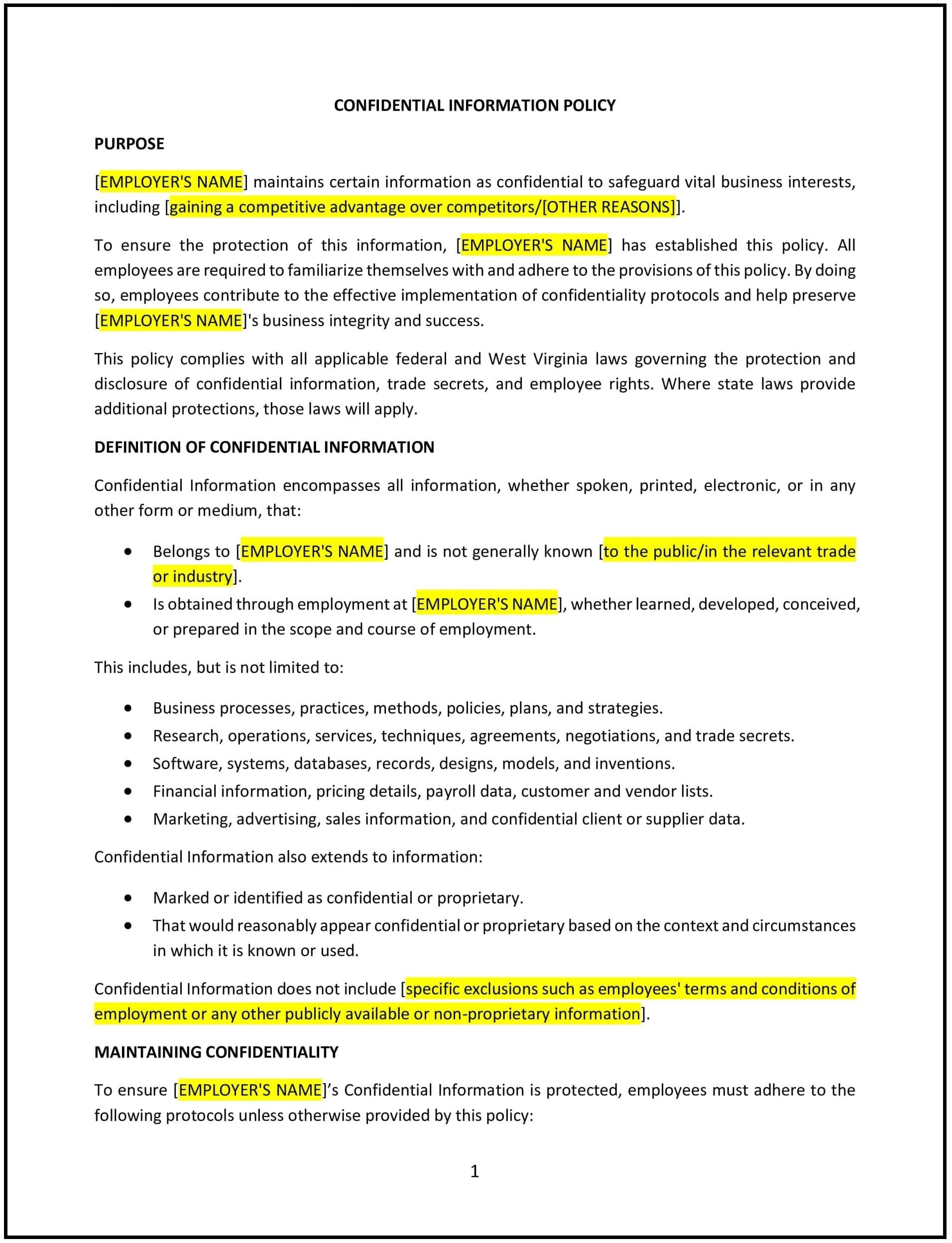Confidential information policy (West Virginia): Free template
Got contracts to review? While you're here for policies, let Cobrief make contract review effortless—start your free review now.

Customize this template for free
Confidential information policy (West Virginia)
A confidential information policy helps West Virginia businesses protect sensitive and proprietary data, including trade secrets, client information, and employee records. This policy defines what constitutes confidential information, establishes guidelines for handling and sharing such information, and outlines the responsibilities of employees in safeguarding the company’s intellectual property and private data.
By implementing this policy, businesses can reduce the risk of data breaches, promote legal compliance, and protect their competitive advantage.
How to use this confidential information policy (West Virginia)
- Define confidential information: Clearly define what constitutes confidential information, including but not limited to trade secrets, business plans, client data, financial information, and employee records.
- Establish access control: Specify who within the company is authorized to access confidential information, based on the principle of "need to know." Ensure that only employees who require the information for their roles have access.
- Set guidelines for handling information: Provide guidelines for handling confidential information, including how it should be stored (e.g., secure systems, encrypted files), shared (e.g., password protection, secure communication channels), and disposed of (e.g., shredding physical documents, securely deleting digital files).
- Address confidentiality during employment and post-employment: Specify that employees must protect confidential information both during their employment and after their departure from the company, outlining any non-disclosure agreements (NDAs) or confidentiality clauses in employment contracts.
- Prohibit unauthorized disclosure: Clearly state that disclosing confidential information without authorization is prohibited, and outline the consequences for violating this policy.
- Provide reporting mechanisms: Establish a process for employees to report suspected breaches of confidentiality, either through a designated HR or security contact, and ensure that reports are handled promptly and confidentially.
- Ensure compliance with laws: Make sure the policy aligns with federal and state laws regarding privacy, such as the West Virginia Data Protection Act, as well as any industry-specific regulations (e.g., HIPAA for healthcare data).
Benefits of using this confidential information policy (West Virginia)
This policy offers several benefits for West Virginia businesses:
- Protects sensitive data: Safeguards the company’s trade secrets, proprietary information, and client data from unauthorized access, use, or disclosure, ensuring that sensitive business information remains secure.
- Enhances legal compliance: By adhering to legal and regulatory requirements related to data privacy, the business reduces the risk of legal penalties and reputational damage.
- Reduces the risk of data breaches: Clear guidelines for handling and storing confidential information help minimize the risk of accidental or malicious data breaches.
- Maintains competitive advantage: Protecting proprietary information ensures that the company’s innovations, strategies, and processes remain confidential, maintaining its edge in the market.
- Increases employee accountability: Employees are more likely to take their responsibility for protecting confidential information seriously when clear expectations and consequences are outlined.
Tips for using this confidential information policy (West Virginia)
- Communicate the policy clearly: Ensure that all employees understand what constitutes confidential information and their role in protecting it, from proper storage to secure sharing.
- Provide regular training: Offer training on how to handle confidential information, including practical tips on securing electronic files, avoiding data leaks, and recognizing potential security threats.
- Implement technical safeguards: Use secure systems for storing and transferring confidential information, such as encrypted files, two-factor authentication, and secure email.
- Monitor access: Keep track of who accesses confidential information and ensure that employees only have access to the information necessary for their job.
- Enforce the policy: Take swift and appropriate action if there are violations of the policy to reinforce the importance of confidentiality and maintain the integrity of the business’s data protection practices.